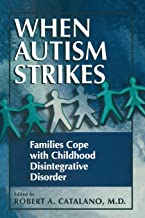Childhood Disintegrative Disorder
Childhood disintegrative disorder (CDD), also known as Heller’s syndrome and disintegrative psychosis, is a rare condition characterized by late onset (>3 years of age) of developmental delays in language, social function, and motor skills.
Cluster Number:
Wiki Number: W039
Diagnosis: Childhood Disintegrative Disorder
US Patients:
World Patients:
Sex Ratio:
Age Onset: Ages3-4
Brain Area:
Symptoms: Child’s language, social, play, motor skills reverse, loses control over bowel and bladder. Interaction, communication lag.
Progression: Excess fats build in the brain and nervous system with benign tumors growing in the brain; myelin sheaths in brain lost.
Causes:
Medications: Antipsychotics for behavior problems and anticonvulsants to reduce seizures.
Therapies: Applied Behavior Analysis-teaches adaptation. Sensor experiences enriched
Youtube Video: Childhood Disintegrative Disorder
Amazon or Library Book:
When Autism Strikes-Families Cope With Childhood Disintegrative Disorder
(Published,1998; $101.11 – new; cheaper, used copies)
Click to link or order from Amazon.

